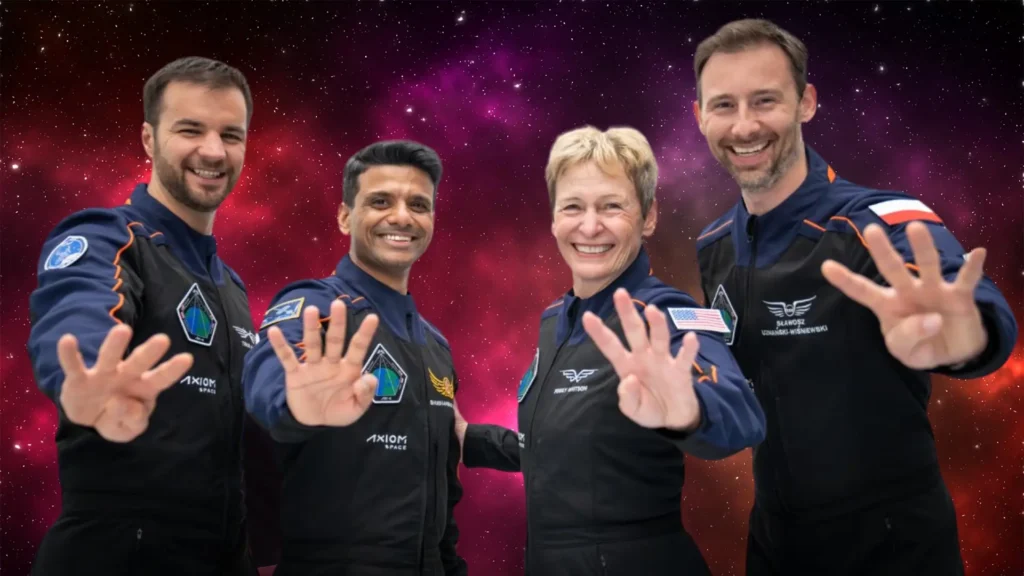Mission Overview
- Mission type: (Axiom-4 Mission) Private crewed human spaceflight to the International Space Station (ISS).
- Operator: Axiom Space with launch by SpaceX using Falcon 9 Block 5 booster B1094.2.
- Spacecraft: Crew Dragon C213, the final new Dragon capsule built by SpaceX, making its first flight on this mission.
- Launch site: Kennedy Space Center, LC‑39A; docking targeted at Harmony’s zenith port on ISS.
- Planned launch window: Originally June 10–11, 2025 (08:00 EDT), though currently delayed indefinitely pending repairs.
- Duration: Expected 14–21 days aboard ISS.
- Landing: Splashdown in the Pacific Ocean off the U.S. West Coast.
Crew Composition
- Peggy Whitson (Commander, Axiom Space / USA)
- Former NASA astronaut with longest cumulative U.S. spaceflight time. Commands her second commercial mission.
- Former NASA astronaut with longest cumulative U.S. spaceflight time. Commands her second commercial mission.
- Shubhanshu Shukla (Pilot, ISRO / India)
- Air Force Group Captain; will be the first Indian to visit the ISS and second overall since 1984.
- Air Force Group Captain; will be the first Indian to visit the ISS and second overall since 1984.
- Sławosz Uznański-Wiśniewski (Mission Specialist, ESA/Poland)
- Poland’s second astronaut after 1978, flying via European Space Agency support.
- Poland’s second astronaut after 1978, flying via European Space Agency support.
- Tibor Kapu (Mission Specialist, Hungary)
- Representing Hungary’s HUNOR program; selected as mission specialist, a mechanical engineer by training.
Research & Objectives
- Carries ~60 science experiments from 31 countries—the most extensive research payload yet for an Axiom mission.
- Collaborations include:
- NASA–ISRO: Seven microgravity experiments led by Indian scientists—studying muscle regeneration, microalgae growth, edible sprouts, tardigrade survival, human-tech interaction, and more.
- Global partners like Saudi Arabia, Brazil, Nigeria, UAE, plus European teams exploring life-sciences, material sciences, and Earth observation.
- NASA–ISRO: Seven microgravity experiments led by Indian scientists—studying muscle regeneration, microalgae growth, edible sprouts, tardigrade survival, human-tech interaction, and more.
Flight Profile & Delays
- Flight plan: Falcon 9 launches Dragon → Stage separation → Dragon phasing burns → Automated rendezvous and docking → ~2 weeks aboard ISS → undocking → splashdown off West Coast
Delays:
- Scrubbed June 10 due to weather concerns.
- Further delayed June 11 launch to address a liquid‑oxygen (LOX) leak in the Falcon 9 first stage.
- No new launch date announced yet; officials awaiting repairs and range availability.
Significance
- First ISS missions for India, Poland, and Hungary in over 40 years, cementing their presence in low-Earth orbit.
- Solidifies growing commercial pathways for national space agencies via private missions, bypassing extensive indigenous infrastructure.
- Serves as proof-of-concept for Axiom’s broader mission—establishing the first commercial space station as the ISS successor
What’s Next?
- Fix LOX leak and schedule the final static-fire test.
- Announce a new launch window once technical and range checks are completed.
- Continue crew training and integration, including ISS docking rehearsal and science prep.
In short, Axiom Mission 4 is a landmark flight that blends multinational representation, cutting-edge microgravity research, and private-sector innovation. It underscores the growing influence of commercial platforms in facilitating global spaceflight.
Rread More : Who Drank All the Matcha? How Tourism Drained a Japanese Town & Get More Discount on Indigo Coupon Code .
